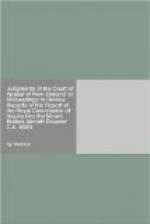It is established in New Zealand that in appropriate proceedings the Courts may prevent a Commission of Inquiry—whether a Royal Commission, a statutory Commission or perhaps a combination of the two—from exceeding its powers by going outside the proper scope of its inquiry. That basic principle was clearly accepted by this Court in Re Royal Commission on Licensing 1945 N.Z.L.R. 665. See especially the judgment of Myers C.J. at pp. 678 to 680. As he indicated, the principle is implicit in the judgment of the Privy Council in Attorney-General for Commonwealth of Australia v. Colonial Sugar Company 1914 A.C. 237. It is also clear that in a broad sense the principles of natural justice apply to Commissions of Inquiry, although what those principles require varies with the subject-matter of the inquiry. The leading authority is the decision of this Court in Re Royal Commission on State Services 1962 N.Z.L.R. 96.
In recent times Parliament has shown an increasing concern that natural justice should be observed by Commissions. In 1958 s. 4A was inserted in the Commissions of Inquiry Act 1908, expressly giving any person interested in the inquiry, if he satisfied the Commission that he had an interest apart from any interest in common with the public, a right to appear and be heard as if he had been cited as a party. Then in 1980, just as the Erebus Commission was about to start, the section was replaced and strengthened. The main changes made are that any person who satisfies the Commission that any evidence given before it may adversely affect his interests must be given an opportunity to be heard in respect of the matter to which the evidence relates; and every person entitled to be heard may appear in person or by his counsel or agent. In giving this right to representation by counsel the Legislature has gone further than observations made in this Court in the State Services case at pp. 105, 111 and 117.
Some statements in the judgments in that case are very relevant to the present case. They are also entirely consistent with the spirit of the changes made by Parliament in 1980. Gresson P. at p. 105 and North J. at p. 111 both gave an inquiry into a disaster as an example of the kind of inquiry where the requirements of natural justice would be more extensive than in inquiries into a general field. Cleary J. stressed at p. 117 that, while Commissions have wide powers of regulating their own procedure, there is the one limitation that persons interested (i.e. apart from any interest in common with the public) must be afforded a fair opportunity of presenting their representations, adducing evidence, and meeting prejudicial matter.




